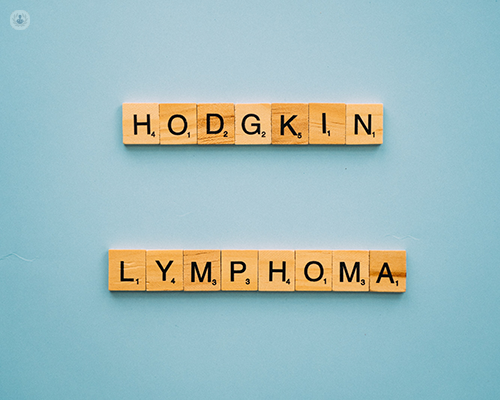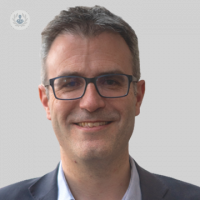What is Hodgkin lymphoma?
Written by:Hodgkin lymphoma is a type of cancer that affects an estimated 2,000 people in the UK each year.
Here to provide an expert insight into Hodgkin lymphoma, including its symptoms, risk factors and treatment, is Dr Graham Collins, renowned consultant haematologist based in Oxford.

What is Hodgkin lymphoma?
Lymphoma is a type of cancer of the immune system cells (lymphocytes). Lymphocytes normally live in the lymph nodes, which are found throughout the body and in the spleen.
There are two main types: Hodgkin and non-Hodgkin lymphoma.
What are the symptoms, and how is the diagnosis of Hodgkin lymphoma made?
The most common symptom of Hodgkin lymphoma is a lump that can be felt in the neck. Lumps can occur elsewhere as well, such as under the arm or in the groin. They can also develop inside the body, such as in the chest, causing breathlessness and cough.
Lymphoma is a very metabolically active condition. It can cause fatigue, fever, drenching night sweats, weight loss and itch.
The diagnosis is made with a biopsy. This is either an excision biopsy (where a lymph node is removed) or a core biopsy (where an ultrasound scan guides a needle to remove a sample of a lymph node). In order to find out exactly where the lymphoma is, a PET scan is often performed.
How does treatment vary based on the stage of Hodgkin lymphoma?
The aim of treating Hodgkin lymphoma is to cure it, and this is successful most of the time.
Chemotherapy is the backbone of treatment. Early-stage disease (which is usually located completely above the diaphragm) is often treated with fewer cycles of chemotherapy than more advanced stage disease. Radiotherapy is also a component of treatment for some patients, especially with early-stage disease.
Various types of chemotherapy can be used in Hodgkin lymphoma, such as ABVD (a four-drug combination), escalated BEACOPDac (a more intensive chemotherapy regimen that can cure more people but that does have more side effects), and AVD combined with a targeted chemotherapy antibody drug called Brentuximab Vedotin.
Are there any risk factors or ways to prevent Hodgkin lymphoma?
The cause of Hodgkin lymphoma is unknown, but family members are at a slightly higher risk.
What distinguishes Hodgkin lymphoma from other types of lymphoma?
Hodgkin lymphoma is more likely to affect young people. Indeed, Hodgkin lymphoma is the commonest cancer to affect the teenage and young adult group, although it can occur at any age. It is among the most curable types of cancer.
Are there new treatments or therapies for Hodgkin lymphoma in development?
There is lots of research on Hodgkin lymphoma. A class of immunotherapy drug called PD1 inhibitors are very active in Hodgkin lymphoma, and these are being tested in the frontline setting - possibly as a way of reducing the need for the current full courses of chemotherapy.
Likewise, special blood tests that detect low levels of lymphoma-associated DNA are also being tested to see if this can help guide treatment.
Dr Graham Collins is a distinguished consultant haematologist with over 20 years’ experience who specialises in Hodgkin lymphoma, chemotherapy and immunotherapy.
If you would like to consult your options with an expert, do not hesitate to book an appointment with Dr Collins via his Top Doctors profile today.


